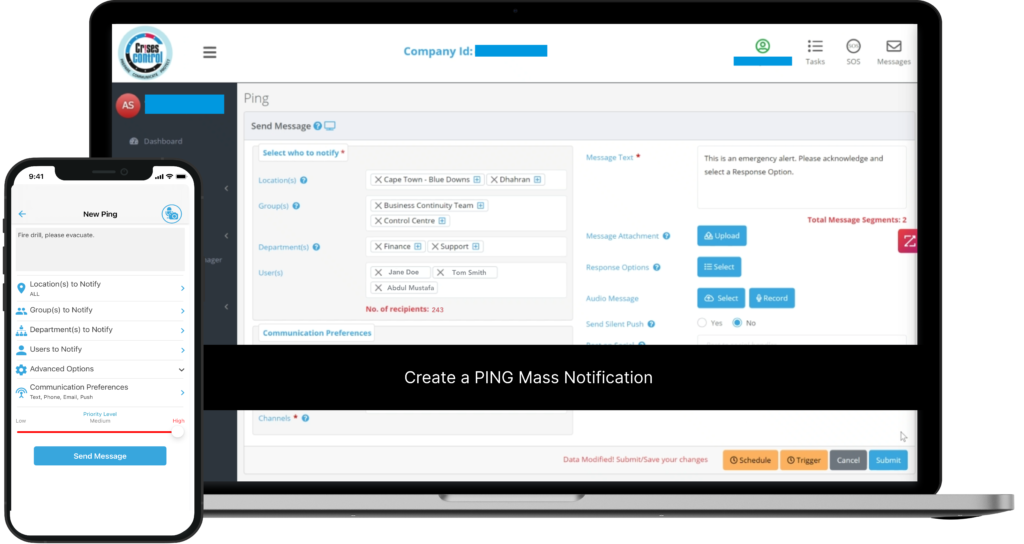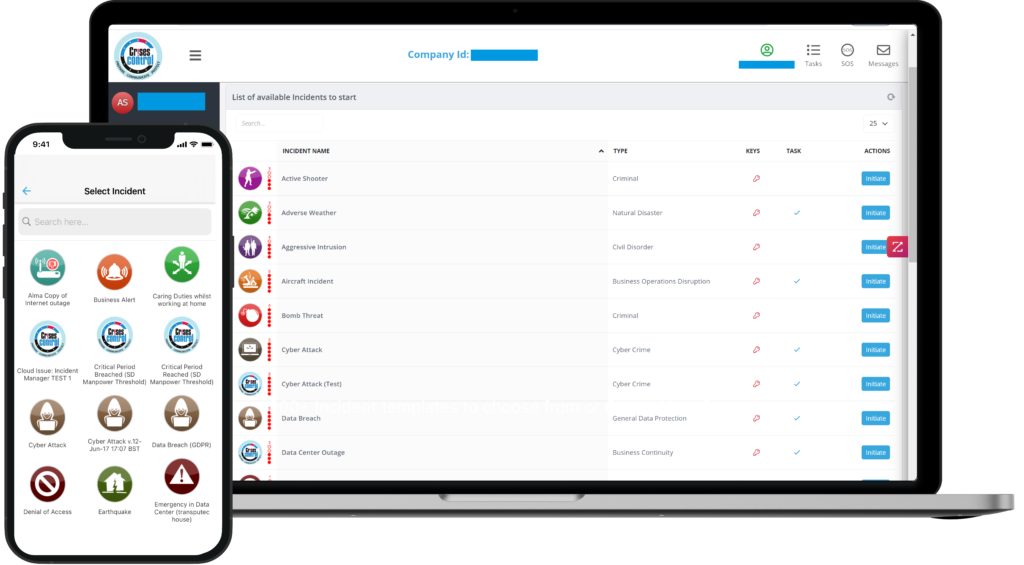Written by Anneri Fourie | Marketing Executive
In an increasingly complex and interconnected global environment, organisations are exposed to a growing number of threats. Whether it’s a natural disaster, cyberattack, political unrest, or a major operational disruption, the ability to respond quickly is what often separates minor issues from full-scale catastrophes. For large organisations spread across multiple regions, the complexity of managing crises is compounded by time zone differences, distance, and varying local regulations. A reliable critical event management platform can significantly accelerate response times, helping organisations protect their employees, assets, and reputation.
In this blog, we’ll explore how these platforms help global businesses respond to emergencies faster and smarter. We’ll also highlight how Crises Control, a trusted leader in crisis management, supports businesses in safeguarding their operations, no matter where or when a crisis hits.
Why Fast Emergency Response Is Non-Negotiable for Global Organisations
In a crisis, every minute counts. The faster you can respond, the better your chances of limiting damage, reducing downtime, and safeguarding your people. But for global organisations, swift responses are often easier said than done.
Common Challenges Global Organisations Face
- Geographical Distance: With offices and teams spread out across multiple regions, coordinating a fast response can be challenging.
- Time Zone Differences: While one office is in the middle of a workday, another could be hours away from waking up, making real-time coordination tough.
- Language and Cultural Barriers: Miscommunication can happen easily when people from different cultures and languages need to share critical information.
- Complex Operations: Larger organisations often have multiple teams, systems, and workflows, all of which need to be synchronised during an emergency.
These challenges make manual crisis responses slow and inefficient. That’s where a critical event management platform for global organisations steps in, providing automated tools that make emergency management faster, smarter, and more effective.
Key Features of a Critical Event Management Platform That Accelerate Response Times
When selecting the best critical event management platform for global organisations, it’s important to look for features that are specifically designed to help large, geographically diverse companies respond to crises more efficiently.
1. Automated Alerts for Instant, Accurate Communication
The first step in managing a crisis is ensuring everyone involved knows what’s happening—and quickly. Manual alert methods, like emails or phone chains, are too slow, especially for larger organisations.
A good critical event management platform automates the entire alert process, sending real-time notifications across various channels like SMS, email, push notifications, and even voice calls. This instant communication means no one is left waiting for instructions, no matter where they are located.
Crises Control’s Ping Mass Notification system allows organisations to send automated, multi-channel alerts in seconds, ensuring the right people get the right information immediately. For instance, if there’s an earthquake in Tokyo, or a cyberattack in London, your entire team—no matter where they are—can receive alerts within moments.
Interested in our Ping Mass Notification Software?
Efficiently alert everyone in seconds at scale with our Mass Notification System – PING, get the message out fast and ensure rapid response and recovery.

2. Coordinated Resource Management for Efficient Response
During a crisis, simply sending alerts isn’t enough. You need to coordinate resources—both human and physical—effectively to respond to the situation. This includes mobilising emergency teams, securing assets, and notifying external agencies.
A critical event management platform simplifies resource coordination by allowing you to assign tasks, track progress in real time, and ensure every team member knows their role. This type of organised response significantly reduces confusion and helps ensure the crisis is handled quickly.
Crises Control’s Incident Manager Module and Task Manager allows you to assign and track tasks in real-time. This structured approach ensures every team member is in sync, drastically reducing delays and miscommunication during a crisis.
3. Real-Time, Two-Way Communication Across Channels
In a fast-paced crisis, one-way alerts won’t cut it. Your teams need a way to communicate in real-time, share updates, and make decisions as things evolve. For global organisations, this is especially important given the time zone differences and geographic distances.
A critical event management platform provides multiple channels for two-way communication, such as real-time chat, phone, or video. This allows for smooth coordination across teams, no matter where they are located.
Crises Control goes even further with its SOS Panic Button feature, which allows employees to request immediate assistance if they’re in danger. This is especially helpful for organisations with remote workers or staff in high-risk areas. By enabling quick, two-way communication, you can speed up decision-making and respond faster to emerging threats.
4. Automating Key Processes to Minimise Human Error
Human error is one of the most common causes of delays and mistakes during a crisis. In high-stress situations, it’s easy to overlook critical tasks, miscommunicate, or make rushed decisions that make things worse.
A top-tier critical event management platform can automate key actions, such as alerting the right people, assigning tasks, and triggering incident response plans. Automation reduces the risk of human error, ensuring critical steps aren’t missed, even during high-pressure situations.
Crises Control’s Incident Plan Builder allows you to create pre-configured emergency response plans that automatically activate based on specific events. By automating tasks, the platform helps organisations reduce response times and ensures no crucial steps are forgotten.

Interested in our Incident Management Software?
Customise your Crisis Incident Management Software to meet your specific needs with our flexible tools & stay connected and informed during the crisis and incident management process
Overcoming Global Challenges with Crises Control
For global organisations, responding to critical events isn’t just about speed. It’s also about overcoming the inherent challenges of operating across different time zones, languages, and local regulations. This is where a platform designed for global operations can make all the difference.
1. Multi-Language Support and Regional Customisation
Different regions may require different responses due to varying languages, cultures, and regulations. A critical event management platform needs to be flexible enough to accommodate these differences while still providing a unified global response.
Crises Control’s multi-language support and custom alert templates enable organisations to tailor messages based on regional needs without sacrificing consistency. This means you can send targeted alerts to specific regions while ensuring your overall response plan is globally coordinated.
2. 24/7 Global Coverage Across Time Zones
Critical events can happen at any time, anywhere. Your critical event management platform needs to provide round-the-clock coverage, regardless of where your teams are located.
Crises Control operates on its own cloud infrastructure, ensuring that it continues to function even if major platforms like Microsoft are down. This ensures that your organisation is always prepared, no matter the time or place.
The Power of Data: Learning from Every Incident
One of the key advantages of using a critical event management platform is the ability to collect and analyse data from past incidents. By reviewing what went right—and what went wrong—organisations can continuously refine their emergency response plans, making them more effective over time.
Crises Control’s Reporting and Audit feature provides detailed reports on every aspect of an incident, from the time it took to deliver alerts to task completion rates. These insights are invaluable for training, compliance, and improving future crisis responses.
Conclusion: Take Control of Your Crisis Response with Crises Control
In an unpredictable world, global organisations need a critical event management platform that not only helps them respond faster, but also smarter. With automated alerts, efficient resource management, and real-time communication tools, platforms like Crises Control give businesses the ability to respond to any crisis with speed and confidence.
Crises Control goes beyond the basics, offering features specifically tailored to global organisations. Whether you need multi-language support, region-specific alerts, or round-the-clock global coverage, Crises Control has you covered.
Don’t wait until the next crisis exposes gaps in your emergency response. Contact Crises Control today for a free demo and see how our platform can help your organisation respond to critical events faster, smarter, and more efficiently than ever before.
Request a FREE Demo

